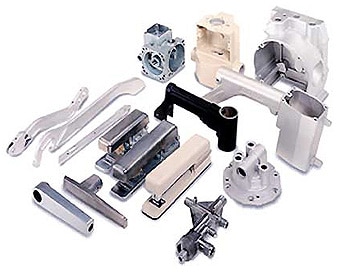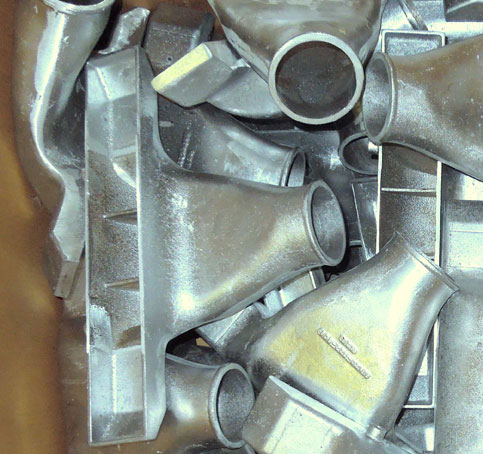Discovering the Versatile Uses and Applications of Light Weight Aluminum Castings in Modern Industries
Aluminum spreadings have actually come to be integral to numerous contemporary markets as a result of their one-of-a-kind homes. They use significant benefits in weight decrease, thermal conductivity, and corrosion resistance. From automobile technologies to applications in durable goods and building, their flexibility is remarkable. The true degree of their impact prolongs past prompt benefits, hinting at broader effects for sustainability and effectiveness. What lies in advance for light weight aluminum spreadings in an ever-evolving commercial landscape?
Automotive Industry Innovations
The automotive industry has actually significantly welcomed aluminum castings to enhance car efficiency and performance. By utilizing light weight aluminum, producers can produce lighter parts, which add to enhanced gas economic climate and lowered exhausts. Secret applications consist of engine blocks, transmission situations, and structural parts, where the material's strength-to-weight ratio delivers toughness without including excess weight.
Light weight aluminum castings also provide premium thermal conductivity, which helps in much better warm dissipation, consequently enhancing engine performance. Furthermore, developments in casting innovations, such as die casting and sand casting, make it possible for the manufacturing of complex geometries, enabling ingenious designs that optimize space and capability.
The recyclability of aluminum lines up with sustainability goals in the vehicle market, promoting ecologically pleasant practices. As the industry remains to introduce, using aluminum castings is likely to broaden, driving further developments in automobile layout and efficiency.
Aerospace Applications and Innovations
While the aerospace market remains to focus on weight decrease and gas effectiveness, light weight aluminum spreadings have actually emerged as an essential material choice for numerous applications. Their lightweight nature, paired with high strength-to-weight ratios, enables substantial enhancements in airplane performance and effectiveness. Light weight aluminum castings are generally made use of in structural components, such as body frameworks and wing parts, where minimizing weight is crucial.
Recent developments in aluminum casting innovations, consisting of improved alloy solutions and accuracy spreading strategies, have additionally boosted the material's efficiency capabilities. These advancements make it possible for the manufacturing of complicated geometries and elaborate designs while maintaining structural stability. Additionally, light weight aluminum's outstanding corrosion resistance guarantees durability and integrity in severe aerospace settings.
As the aerospace field progressively welcomes sustainability, aluminum castings use a recyclable solution that straightens with eco-friendly methods, making them a critical element in the advancement of next-generation airplane.
Consumer Product and Everyday Products
As consumers increasingly look for lightweight yet resilient materials for everyday products, light weight aluminum castings have actually gained popularity in various durable goods. The unique properties of light weight aluminum, including its resistance to corrosion and excellent thermal conductivity, make it a suitable option for things like kitchenware, household appliances, and exterior gear. As an example, light weight aluminum cast pots and frying pans give even warm circulation, enhancing cooking efficiency. Additionally, the use of aluminum in products such as bicycle frameworks and baggage guarantees an equilibrium in between stamina and mobility. Suppliers appreciate light weight aluminum castings for their convenience, as they can be easily molded right into complex forms while maintaining structural honesty. In addition, the capacity to reuse light weight aluminum without degrading its homes lines up with expanding consumer preferences for lasting products. Overall, light weight aluminum castings are important to the manufacturing of resilient, useful, and cosmetically pleasing durable goods, satisfying the demands of contemporary lifestyles.
Building and Architectural Uses
Aluminum castings have ended up being an essential part in construction and building style, specifically as a result of their toughness and light-weight nature. These residential properties make light weight aluminum an ideal choice for numerous applications, consisting of structural aspects, exteriors, and ornamental functions - Aluminum Foundry. Contractors and designers progressively utilize light weight aluminum castings for window structures, doors, and roof systems, enhancing both capability and looks. The product's resistance to corrosion better extends its lifespan, decreasing upkeep prices and ensuring durability in varied environmental conditions
In addition, light weight aluminum can be quickly formed right into detailed designs, permitting ingenious building expressions. Its adaptability helps with the creation of customized pieces that fulfill details style requirements, from elaborate barriers to complex assistances. As sustainability comes to be a top priority, light weight aluminum's recyclability adds to its appeal in environmentally friendly construction practices. Overall, light weight aluminum spreadings are transforming the construction sector by supplying light-weight, long lasting, and aesthetically appealing options.
Electric and Digital Parts
Light weight aluminum castings play a necessary function in the production of lightweight electrical rooms, which boost transportability and performance in numerous applications. On top of that, their superb thermal conductivity makes them ideal for heat sinks, making sure peak efficiency and long life of electronic components. Furthermore, light weight aluminum's conductive homes add to its usage in numerous electric conductors, highlighting its value in modern technology.
Lightweight Electric Enclosures
Lightweight electric enclosures play an important role in shielding delicate digital elements from ecological factors and physical damage. Built from aluminum castings, these units are valued for their strength-to-weight ratio, making them ideal for different applications throughout industries. Their lightweight nature help in minimizing general system weight, which is important in mobile and portable electronics. Additionally, light weight aluminum's rust resistance enhances durability, expanding the lifespan of the encased components. The ability to mold light weight aluminum into intricate shapes allows for customized designs, accommodating certain demands while ensuring effective heat dissipation. Furthermore, these rooms can be quickly integrated into existing systems, providing flexibility and adaptability in modern-day technological settings. In general, light-weight aluminum units greatly add to the effectiveness of electronic gadgets.
Heat Sinks and Conductors
While lots of materials are used in digital elements, light weight aluminum spreadings Read More Here attract attention for their efficiency in heat administration as warm sinks and conductors. Their superb thermal conductivity permits reliable warmth dissipation, which is important in protecting against the overheating of electronic devices. Light weight aluminum's lightweight nature even more enhances its viability for applications where weight is a substantial factor, such as in aerospace and automotive sectors. In addition, light weight aluminum spreadings can be easily built into complicated forms, giving layout adaptability for optimizing thermal efficiency. The deterioration resistance of light weight aluminum likewise contributes to the longevity and integrity of these components in numerous settings. As innovation developments and gadgets become much more small, the demand for efficient warm administration solutions, like light weight aluminum spreadings, remains to expand.
Marine Market Utilization
The aquatic market increasingly counts on aluminum castings for their exceptional durability and deterioration resistance. These buildings make light weight aluminum a perfect selection for different applications, consisting of boat hulls, engine components, and aquatic equipment. The light-weight nature of aluminum spreadings enables boosted fuel effectiveness and much easier ability to move in boat, which is important for both business and entertainment vessels.

Aluminum spreadings likewise offer significant price benefits due to their lengthy lifespan and reduced maintenance demands, reducing the total operational expenditures for marine drivers. Furthermore, the versatility of light weight aluminum allows for complex layouts that can satisfy details performance requirements.
Suppliers in the marine field utilize innovative casting methods to produce complicated forms, guaranteeing that parts meet strenuous safety and security and performance requirements. As the need for high-performance marine vessels expands, light weight aluminum castings are positioned as a vital material in boosting the functionality and durability of aquatic equipment.
Sustainability and Recycling in Aluminum Spreading

Aluminum Recycling Refine
Recycling aluminum plays a crucial role in lessening environmental effect and preserving sources within the casting market. The light weight aluminum reusing procedure begins with the collection of scrap aluminum, which can include old elements, making waste, and post-consumer products. This scrap is then sorted, cleansed, and shredded right into small pieces to assist in melting.
When prepared, the light weight aluminum scrap is melted in a furnace at lower temperature levels than key light weight aluminum manufacturing, greatly minimizing power intake. The liquified light weight aluminum is then cast into ingots or other shapes for reuse in different applications - Wisconsin Aluminum Foundry. This closed-loop system allows for the efficient recovery of aluminum, protecting its residential properties while lowering the demand for virgin products. As a result, the reusing process is a vital part of you can try this out lasting techniques in light weight aluminum spreading
Environmental Benefits
While light weight aluminum spreading plays a crucial role in numerous sectors, its ecological advantages are especially amazing pertaining to sustainability and resource conservation. The lightweight nature of aluminum adds to energy performance in transport, minimizing fuel consumption and emissions. Additionally, light weight aluminum spreading assists in using recycled materials, substantially decreasing the energy required for manufacturing contrasted to main aluminum. This reusing process minimizes waste and decreases the ecological impact connected with mining and refining raw products. Furthermore, aluminum is 100% recyclable without destruction of its buildings, promoting a sustainable lifecycle. By picking light weight aluminum casting, industries can substantially minimize their carbon footprint while promoting source effectiveness, making it an essential option in the search of eco-friendly production practices.
Closed-Loop Solutions

Often Asked Inquiries
What Are the Key Advantages of Light Weight Aluminum Castings Over Various Other Products?
Aluminum castings provide lightweight buildings, excellent rust resistance, and high strength-to-weight proportions. They can be conveniently molded into complex shapes, offer great thermal and electric conductivity, and are economical, making them preferable over numerous alternate products.
Exactly how Is the Light Weight Aluminum Spreading Refine Ecologically Pleasant?
The light weight aluminum casting process is eco-friendly due to its recyclability, low energy usage, and minimized waste manufacturing. Its capability to use recycled materials reduces Your Domain Name the carbon footprint, advertising sustainability within producing methods.
What Are Typical Obstacles in Aluminum Spreading Production?
Typical difficulties in aluminum casting manufacturing consist of preserving dimensional accuracy, managing thermal contraction, protecting against issues like porosity and additions, ensuring correct mold and mildew design, and optimizing production efficiency while lessening product waste and environmental effect.
Just How Do Aluminum Castings Compare in Expense With Other Manufacturing Techniques?
Aluminum spreadings usually provide affordable costs contrasted to various other making techniques, especially for medium to high-volume manufacturing. Their reduced initial tooling expenditures and effective product use can result in desirable economics with time.
What Future Fads Are Expected in Light Weight Aluminum Spreading Technology?
Future patterns in aluminum spreading technology are expected to include improvements in automation, improved alloy structures, enhanced reusing methods, and the combination of 3D printing, all focused on boosting efficiency, minimizing prices, and reducing ecological impact.
Current developments in light weight aluminum spreading modern technologies, including boosted alloy solutions and precision casting techniques, have actually further enhanced the material's efficiency capabilities. Aluminum spreadings have actually become a necessary element in construction and architectural style, specifically due to their strength and lightweight nature. The aluminum reusing procedure starts with the collection of scrap aluminum, which can include old parts, manufacturing waste, and post-consumer products. When prepared, the light weight aluminum scrap is thawed in a heater at lower temperatures than primary aluminum production, considerably reducing energy usage. Furthermore, light weight aluminum spreading promotes the usage of recycled products, substantially lowering the energy required for manufacturing compared to main light weight aluminum.